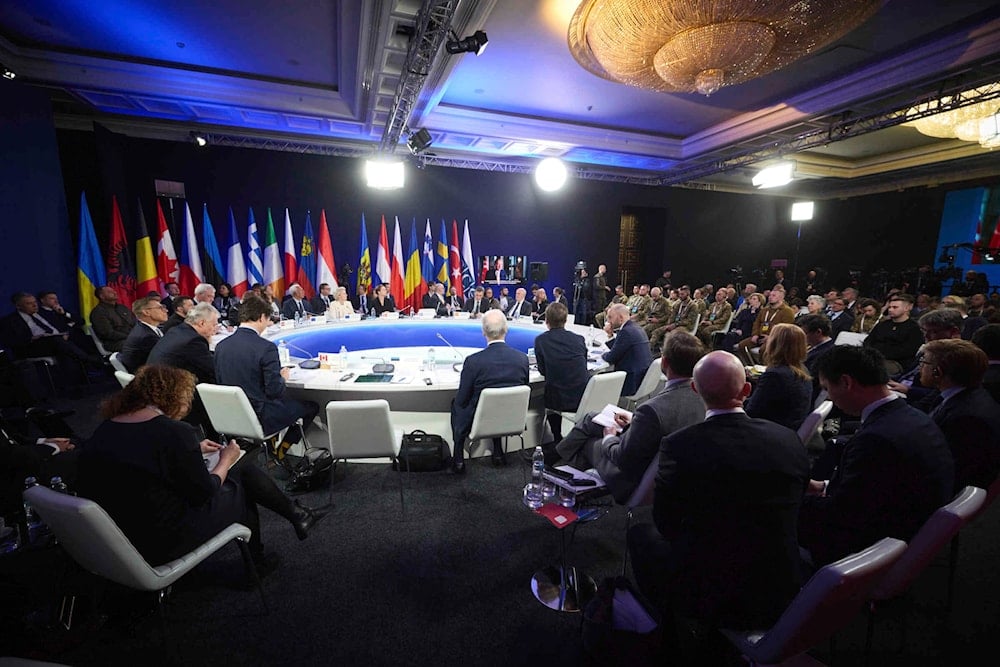NATO prepares for a post-America alliance: Axios
The growing divisions between the US and Europe, fueled by Trump's critical stance on Ukraine and European security, have led European leaders to push for greater autonomy in defense.
-

In this photo provided by the Ukrainian Presidential Press Office, European leaders attend the Support Ukraine summit in Kiev, Ukraine, on February 24, 2025. (Ukrainian Presidential Press Office via AP)
Beyond what President Donald Trump once called "a big, beautiful Ocean," deeper divisions separate the US and its European allies on the third anniversary of the war in Ukraine.
According to an Axios report, the Trump administration has sown uncertainty not only in Kiev but across an entire continent that has long relied on the US as its strongest protector and ally.
Trump describing President Zelensky as a "dictator without elections" plunged US-Ukraine relations to a new low and brought the US-Europe alliance to a crossroads.
As the war enters its fourth year, the US has drifted from both the Ukrainian cause and its NATO allies, leaving European leaders preparing for a future beyond the US alliance, according to the report.
'Era of US dependence over'
Friedrich Merz, the center-right leader poised to become Germany's new chancellor, said after Sunday’s election victory that his "priority...will be to strengthen Europe as quickly as possible" to "achieve real independence from the USA," highlighting a growing transatlantic divide.
A coalition of pro-European political parties in the European Parliament declared in a joint statement on Tuesday that Europe can "no longer fully rely on the United States to defend our shared values and interests" and that it is "high time for Europe to step up its own security."
According to the report, those previously unthinkable statements from both conservatives and progressives echo calls from French President Emmanuel Macron, who, during his visit to Washington on Monday, advocated for European "strategic autonomy."
Many European leaders dismissed the concept of "strategic autonomy" during Trump’s first term, and the issue is now gaining serious attention in light of the war in Ukraine.
That said, Macron and British Prime Minister Keir Starmer, who will also meet with Trump this week, are among several European leaders signaling their readiness to increase defense spending as Trump steps back.
Starmer vowed to deploy troops if needed to "guarantee Ukraine's security," while emphasizing that "US support will remain critical."
Trump critical of Europe role amid Ukraine war
US Defense Secretary Pete Hegseth stated that American troops would not participate in the proposed mission, while former President Trump expressed openness to the concept of a European security force during a phone conversation with Ukrainian President Zelensky, as reported by Axios' Barak Ravid.
The report suggests that although the plan is "plausible," the unclear messaging from Washington could undermine hopes for a favorable peace deal, according to Daniel Fried, former US ambassador to Poland and assistant secretary of State for Europe.
Trump has consistently criticized Zelensky, called for elections in Ukraine, and is said to have opposed a G7 statement labeling Russia as the aggressor in the conflict.
Under Vice President Vance, the Trump administration has criticized Europe for relying on American strength for decades. While they support Europe investing more in its security, this growing divide between the US and Europe is likely to create tensions.
That said, European allies have acknowledged that they will face challenges in bridging the gap in supplying Ukraine, let alone guaranteeing the security of the entire continent.

 3 Min Read
3 Min Read










